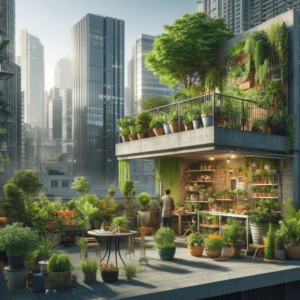In the heart of urban centers, where concrete often overshadows greenery, urban gardening emerges as a revitalizing oasis. Not only does it beautify your living space, but it also contributes to your health and the city’s ecosystem. Urban gardening is a fulfilling hobby for city dwellers, allowing them to cultivate plants and fresh produce within limited spaces. Here’s your comprehensive guide to embarking on urban gardening and enriching your urban living experience.
What is Urban Gardening?
Urban Gardening Defined: Urban gardening involves cultivating plants within an urban environment, utilizing any available space such as balconies, rooftops, patios, and windowsills. This practice can range from growing herbs in containers to creating elaborate raised beds on rooftops and participating in community gardens.
Benefits of Urban Gardening
Urban gardening offers numerous benefits that extend beyond beautifying your immediate surroundings:
- Environmental Benefits: Plants play a crucial role in purifying the air by absorbing carbon dioxide and releasing oxygen, thus enhancing urban air quality.
- Reduces Stress: The act of gardening is therapeutic, helping to alleviate stress and promote relaxation.
- Aesthetic Improvement: Green spaces significantly enhance the aesthetic appeal of your home.
- Access to Fresh Produce: Cultivating your own herbs, vegetables, and fruits ensures a supply of fresh, organic produce right from your balcony or rooftop.
Planning Your Urban Garden
Evaluating Your Space: Begin by assessing the space you have. Consider the amount of direct sunlight it receives, exposure to elements like wind, and the size of the area. These factors will help you determine which types of plants you can successfully grow and the gardening methods most suited to your environment.
Choosing the Right Plants: Select plants based on their suitability for your local climate and the specific conditions of your urban space. Opt for shade-loving plants like ferns or herbs such as mint for areas with limited sunlight. Sunny spots are ideal for growing vegetables like tomatoes and peppers, and flowers such as sunflowers and zinnias.
Setting Up Your Urban Garden
Container Selection: Choose containers that complement your space and ensure they have adequate drainage holes to prevent root damage from water buildup.
Soil and Fertilization: Opt for a high-quality potting mix suitable for container gardening. Supplement this with organic or slow-release fertilizers to provide your plants with essential nutrients throughout their growth cycle.
Irrigation Solutions: Consider installing an efficient watering system, such as drip irrigation or self-watering pots, to maintain optimal moisture levels, especially if managing multiple plants.
Maintaining Your Urban Garden
Regular Upkeep: Plants in containers typically require more frequent watering and fertilizing than those in the ground. Regularly check your plants’ needs and adjust your care routine accordingly.
Pest and Disease Control: Monitor your plants for signs of pests and diseases. Address these issues promptly using natural pesticides or recommended treatments to prevent them from spreading.
Expanding and Enjoying Your Urban Garden
Vertical Gardening and Green Walls: As you gain confidence in basic gardening, explore vertical gardening techniques to maximize your space. Utilize green walls and trellises to grow vines, small fruits, or vegetables.
Community Involvement: If you’re limited by space, consider participating in a local community garden to expand your gardening pursuits and connect with fellow gardeners.
Enjoy Your Garden: Use your garden as a tranquil retreat for relaxation or a vibrant space for social gatherings. The area you cultivate will significantly enhance your urban living experience.
Urban gardening transforms urban living spaces into lush, productive retreats, offering a slice of nature right in the middle of the city. Whether you’re managing a few pots on a windowsill or a comprehensive rooftop garden, the rewards of urban gardening are immense and deeply satisfying.












